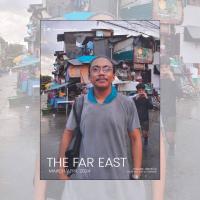 Tokyo Japan between 1968 and 1880.
Tokyo Japan between 1968 and 1880.
The fierce persecution of the hidden Christians of Japan by the Tokugawa daimyo is well known. It lasted 291 years.
The Tokugawa dynasty ruled Japan when U.S. Commodore Perry, followed by negotiator Consul Townsend Harris, signed a treaty with Japan in 1858 that opened the country for trade with the United States. At that time, the Emperor was a powerless non-entity living in seclusion in Kyoto. In 1868, a revolt deposed the Tokugawa rulers. Emperor Meiji was given power and moved to the capital, Edo (now Tokyo).
Behind this restoration were the powerful nationalistic clans backed by those who later became the major trading companies. But the restoration of 1868 did not see the persecution of hidden Christians cease. Instead, it intensified. The powers behind the Emperor ousted Buddhism as the national religion. In its place, Shinto (The Way of the Gods of Japan) was promoted as the official religion. As formerly with Buddhism, Shinto was used in the persecution of Christians. The Emperor was presented as a living Shinto God to be worshipped by all.
The hidden Christians who had passed on their faith in secret for almost 250 years now faced renewed harassment. They were hunted down and put to rigorous and lengthy questioning that often resulted in torture and, at times, death. In Nagasaki, 3,500 Christians were deported to distant provinces to be put on trial. One group of 153 was exiled to the small town of Tsuwano, Shimane Province, in the secluded mountains of southwestern Japan.
In Tsuwano, the interrogating judge was Morioka, who used a technique now called “brainwashing”. Day after day, the Christians were subjected to daylong harangues on the Shinto religion, loyalty to the Emperor, and the “contradiction” of a Japanese following a “foreign” religion. Food and drink were denied.
The leader of the deported Tsuwano Christians was Jinsaburo Moriyama. Judge Morioka lectured him in this way: “Give up this foreign religion and accept the traditional Japanese ‘Way of the Gods’ (i.e. Shinto). We Japanese adore our ancestral sun God. We can see our God with our own eyes. Why do you worship a God you cannot see?”
Jinsaburo, the Catholic leader, replied: “Honourable Sir! Look at it this way. Imagine yourself going on a long journey to another province. Then, when you are returning to your home, it has become pitch dark, and the country road is dangerous and unknown. You are in difficulty. Then a poor farmer, seeing your distress, gives you a lantern which lights your way safely home. On arriving home, do you put the lantern on a platform so that you can adore it? Surely you rather send thanks to the farmer himself for his kindness. Honourable Sir, you are asking me to worship the sun. We Christians give worship and gratitude to the true God who created that sun and placed it in the sky to give us light and warmth.”
For this reply, Morioka had Jinsaburo thrown onto the ice of a frozen lake. Still he stuck to his faith, and all prayed fervently for his endurance. Such bravery did he show that even Judge Morioka was moved, and the execution was delayed. Later, giving in to pressure from other nations, the persecution of Christians finally ended. Jinsaburo and the exiled group returned to Nagasaki, and Jinsaburo’s son was later ordained a priest!
Columban Fr Barry Cairns lives and works in Japan.
Listen to "Japanese Christians witness bravery under brainwashing"
Related links
- Read more from The Far East - November/December 2022

